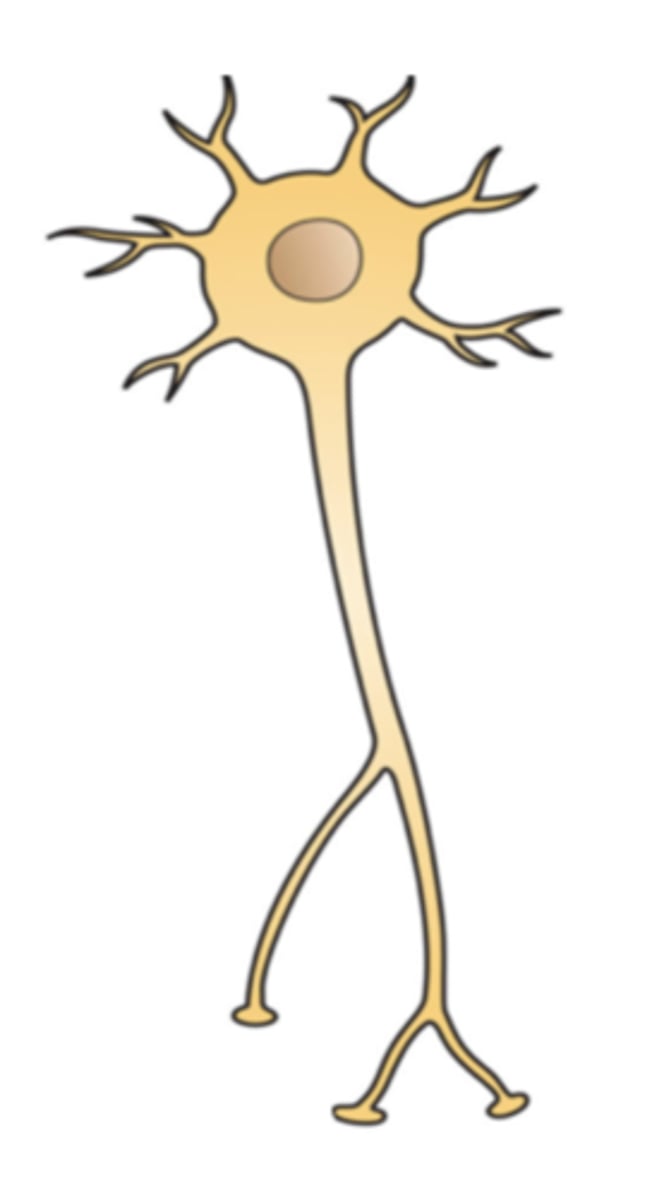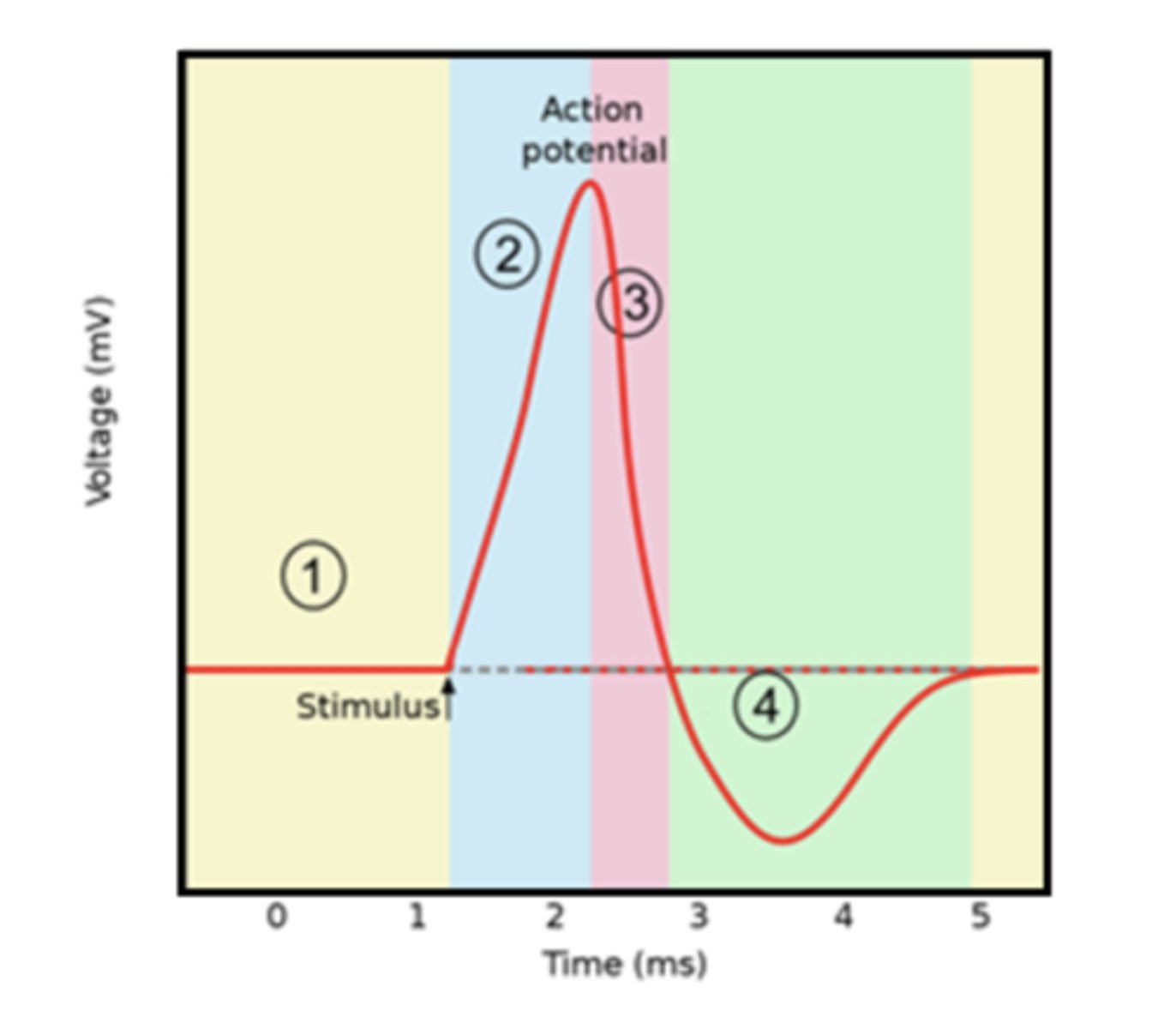Portage Learning Anatomy & Physiology 2: Module 1 Exam
1/27
There's no tags or description
Looks like no tags are added yet.
Name | Mastery | Learn | Test | Matching | Spaced | Call with Kai |
|---|
No analytics yet
Send a link to your students to track their progress
28 Terms
This is a bundle of axons found in the peripheral nervous system.
nerve
This part of the autonomic system accelerates the heart beat and increases breathing rate.
sympathetic nervous system
The ventral root of a nerve contains what type of neurons?
motor (efferent)
This part of a neuron conducts nerve impulses towards the cell body.
denderites
A neuron going to the bicep of the forearm is part of the:
A. Central nervous system
B. Peripheral nervous system
C. Autonomic system
D. Somatic system
E. A&C
F. B&D
F. B&D
The neuron pictured, below, is best described as:
A) Bipolar
B) Multipolar
C) Unipolar
D) Pseudounipolar
B) Multipolar

True or false: Neurons do not physically touch one another.
True
Neurons do not physically touch. They are separated by synapses.
Describe the synthesis and storage of neurotransmitters.
The neuron cell body manufactures neurotransmitters, which are stored in secretory vesicles at the end of axon terminals.
An afferent neuron carries information:
A) From the central to the peripheral nervous system
B) From the peripheral to the central nervous system
C) Within the central nervous system
D) Within the peripheral nervous system
B) From the peripheral to the central nervous system
A presynaptic neuron would be found:
A) Before the synapse
B) After the synapse
C) Inside the synapse
D) Only in the peripheral nervous system
A) Before the synapse
What is the location and function of Satellite cells?
Location: Peripheral nervous system (PNS)
Function: Regulation of environment of neuron cell bodies
A patient's spinal cord was severed in a car accident. Would the patient be expected to regrow axons in their spinal cord? Why or why not?
No; Only PNS axons are capable of regeneration. The spinal cord is in the CNS
Name and describe what is occurring in the neuron cell membrane in section 4 of the diagram. Include the charge of the membrane during this phase.
Hyperpolarization- Potassium gates are slow to close and the charge drops below -70mV and then returns to -70mV once at resting state again.

At rest, a neuron plasma membrane is:
A) 0 mV
B) +40 mV
C) Polarized (around -70mV)
D) Depolarized
C) Polarized (around -70mV)
Which of the following is false concerning the sodium-potassium pump?
A) It maintains the resting phase of an axon.
B) For every three sodium ions pumped out, two potassium ions are pumped in.
C) It must remain in constant operation to maintain the resting state.
D) The overall effect is a negative charge on the outside of the membrane.
D) The overall effect is a negative charge on the outside of the membrane.
True or false: A sensory neuron is signaling the body of extreme pain. This means that the strength of the action potential is greater than usual. Explain your reasoning.
False
Since it is an all or nothing response, the strength of the action potential will not differ. Only the number of neurons firing and frequency differs.
Which of the following statements is true concerning the neuromuscular junction?
A) The NMJ terminates on neurons within the brain and spinal cord.
B) The NMJ terminates on a muscle fiber.
C) The NMJ terminates on a presynaptic motor neuron.
D) The NMJ does not have a synapse.
B) The NMJ terminates on a muscle fiber.
How is a message sent from one neuron to another?
Nerve impluse reach to the end of axon, neurotransmitters fuse with plasma membrane and release into synpase. It then binds to the next neuron, opening Na+ gate in the receiving dendrite which cause depolarization and impulses is carried.
What neurotransmitter is found at the neuromuscular junctions?
acetylcholine
True or False: Action potentials travel in multiple directions within the same neuron.
False (only one direction in the same neuron)
True or False: Reflexes occur only with conscious intervention from the brain.
False
Fill in the blank: In a reflex, the ____________ neuron conducts nerve impulses along a pathway towards the central nervous system.
afferent
Where is the integration center of a reflex located?
CNS
Which of the following statements is false about reflexes?
A) Reflexes do not require higher levels of voluntary processing from the brain.
B) Regulation of blood sugar by hormones is one example of a reflex.
C) Some reflexes can be tested to determine injury.
D) Pulling a hand away from a hot flame is not a reflex; it is entirely voluntary.
D) Pulling a hand away from a hot flame is not a reflex; it is entirely voluntary.
What is true about the stretch reflex?\A) Stretch reflexes help to increase the stretch on a muscle.
B) The patellar reflex tests the stretch reflex of the patella.
C) The muscle spindle detects stretch within the muscle.
D) The effect of the motor signal is to relax a muscle.
C) The muscle spindle detects stretch within the muscle.
What is true about the flexor withdrawal reflex?
A. It does not involve interneurons.
B. It involves excitatory interneurons.
C. It involves inhibitory interneurons.
D. The effect of the reflex is to create a co-contraction of two muscles
E. A&D
F. B&C
F. B&C
Answer the following essay questions:
You touch a hot pan when cooking. List out the steps, in detail, of the nervous pathway of the reflex that occurs. Include any sensory organs involved and the action of the reflex.
1. pain receptor in the skin sends a nerve impluse that moves along the dendrite toward the cell body and CNS
2. after it reaches the cell body, the impluse moves along the axon of the sensory nerve and synapse on the interneurons
3. Excitatory interneurons send signals to motor neurons to the contract bicep and flex elbow to move away from hot pan
4. inhibitory interneurons send signals that prevent tricep contraction so it doesn’t counteract with excitatory interneurons
Answer the following essay questions:
Botulism is a disease caused by a neurotoxin that interferes with the release of Acetylcholine. Patients with this disease experience flaccid paralysis, or the inability to contract their muscles. Explain why this would occur.
Acaetylcholine is found at the NMJ and since muscle contraction needs both nervous and muscular system to work together. Interfering the release of Acetylcholine will be cause no interaction between the nervous and muscular system